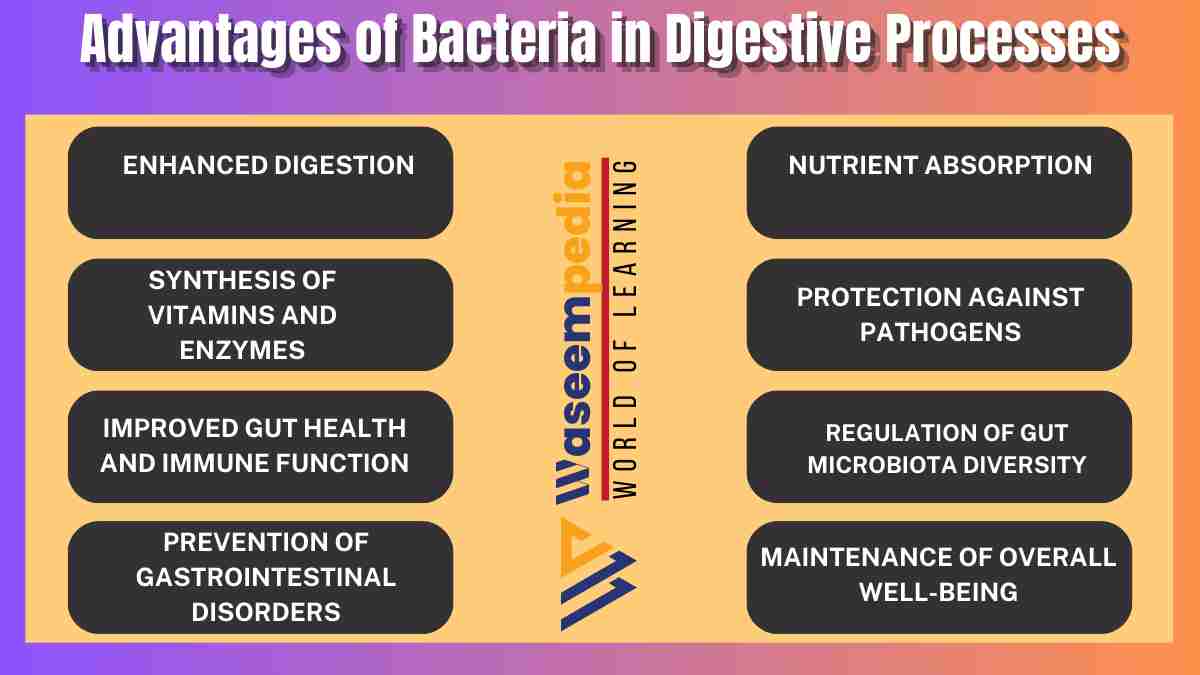Beneficial bacteria in the gut provide many advantages to our digestive processes and overall well-being. Their role in nutrient digestion, fermentation, SCFA production, vitamin synthesis, immune system support, and maintenance of gut barrier function highlights their significant contributions to digestive health.
Nurturing a diverse and balanced gut microbiota through a healthy diet, lifestyle choices, and probiotic supplementation can promote optimal digestive function and enhance overall wellness.
The human digestive system is a complex network of organs and processes that facilitate the breakdown and absorption of nutrients from the food we consume. While the digestive system itself performs many essential functions, bacteria in the gut also play a crucial role in digestive processes.
These beneficial bacteria aid in nutrient metabolism, support the immune system, and promote overall gut health. In this article, we will explore the advantages of bacteria in digestive processes and highlight their significant contributions to our well-being.
Introduction of Bacteria in Digestive Processes
Digestion is the process by which our bodies break down food into smaller, more manageable components that can be absorbed and utilized for energy and growth.
While the human digestive system has its own set of enzymes and mechanisms for digestion, the presence of bacteria in the gut provides additional benefits to the overall digestive processes.
6 Advantages of Bacteria in Digestive Processes
6 Advantages of Bacteria in Digestive Processes are as follows.
1. The Gut Micro biota
The gut microbiota refers to the vast community of microorganisms, primarily bacteria, residing in our gastrointestinal tract. These bacteria, collectively known as the gut microbiome, are essential for maintaining a healthy digestive system.
The gut microbiota is unique to each individual and can be influenced by various factors, including diet, lifestyle, and genetics.
2. Bacteria in Nutrient Digestion
Beneficial bacteria in the gut aid in the digestion and absorption of nutrients from our food. They produce enzymes that break down complex carbohydrates, proteins, and fats into simpler forms that can be more readily absorbed by the body. Bacterial enzymes complement the digestive enzymes produced by our own bodies, enhancing the efficiency of nutrient digestion.
3. Fermentation and Short-Chain Fatty Acid Production
Bacteria in the gut also play a significant role in the fermentation of dietary fiber and other indigestible carbohydrates. They break down these fibers through fermentation, resulting in the production of short-chain fatty acids (SCFAs). SCFAs serve as an important energy source for the cells lining the colon and contribute to overall gut health. They also have anti-inflammatory properties and help maintain a healthy gut environment.
4. Vitamin Synthesis
Certain bacteria in the gut have the ability to synthesize vitamins that are essential for our well-being. For example, bacteria in the colon can produce vitamin K, which is important for blood clotting. Additionally, some bacteria can produce B vitamins, including biotin, folate, and vitamin B12.
These vitamins are crucial for various physiological processes and are absorbed by the body for optimal health.
5. Immune System Support
The gut microbiota plays a vital role in supporting the immune system. Beneficial bacteria interact with immune cells in the gut, promoting the development and maintenance of a balanced immune response.
They help train the immune system to recognize harmful pathogens while maintaining tolerance to harmless substances. This interaction is essential for proper immune function and protection against infections.
6. Gut Barrier Function
The gut barrier serves as a protective barrier that prevents harmful substances, such as pathogens and toxins, from entering the bloodstream. Bacteria in the gut contribute to the maintenance of a healthy gut barrier function.
They help regulate the integrity of the intestinal lining, promote the production of mucus, and compete with pathogenic bacteria for nutrients and attachment sites. A healthy gut barrier function is crucial for preventing the translocation of harmful substances into the body.

